

Dan Chenok is Executive Director of the IBM Center for The Business of Government. He oversees all of the Center's activities in connecting research to practice to benefit government, and has written and spoken extensively around government technology, cybersecurity, privacy, regulation, budget, acquisition, and Presidential transitions. Mr. Chenok previously led consulting services for Public Sector Technology Strategy, working with IBM government, healthcare, and education clients.
Mr. Chenok serves in numerous industry leadership positions. He is a CIO SAGE and member of the Research Advisory Council with the Partnership for Public Service, Fellow of the National Academy of Public Administration, Member of the Board of Directors for the Senior Executives Association, Member of the Government Accountability Office Polaris Advisory Council for Science and Technology, Member of the American University IT Executive Council, and Mentor with the Global Policy, Diplomacy, and Sustainability Fellowship. Previously, he served as Chair of the Industry Advisory Council (IAC) for the government-led American Council for Technology (ACT), Chair of the Cyber Subcommittee of the DHS Data Privacy and Integrity Advisory Committee, Chair of the NIST-sponsored Federal Information Security and Privacy Advisory Board, and two-time Cybersecurity commission member with the Center for Strategic and International Studies. Mr. Chenok also generally advises public sector leaders on a wide range of management issues. Finally, Mr. Chenok serves as an Adjunct Associate Professor with the LBJ School of Public Affairs at the University of Texas in Austin, teaching at the school's Washington, DC Center.
Before joining IBM, Mr. Chenok was a Senior Vice President for Civilian Operations with Pragmatics, and prior to that was a Vice President for Business Solutions and Offerings with SRA International.
As a career Government executive, Mr. Chenok served as Branch Chief for Information Policy and Technology with the Office of Management and Budget, where he led a staff with oversight of federal information and IT policy, including electronic government, computer security, privacy and IT budgeting. Prior to that, he served as Assistant Branch Chief and Desk Officer for Education, Labor, HHS, and related agencies in OMB's Office of Information and Regulatory Affairs. Mr. Chenok began his government service as an analyst with the Congressional Office of Technology Assessment, and left government service at the end of 2003.
In 2008, Mr. Chenok served on President Barack Obama’s transition team as the Government lead for the Technology, Innovation, and Government Reform group, and as a member of the OMB Agency Review Team.
Mr. Chenok has won numerous honors and awards, including a 2010 Federal 100 winner for his work on the presidential transition, the 2016 Eagle Award for Industry Executive of the Year, and the 2002 Federal CIO Council Azimuth Award for Government Executive of the Year.
Mr. Chenok earned a BA from Columbia University and a Master of Public Policy degree from Harvard's Kennedy School of Government.
| Daniel Chenok | Points |
|---|---|
| Academic | 5 |
| Author | 106 |
| Influencer | 90 |
| Speaker | 0 |
| Entrepreneur | 0 |
| Total | 201 |
Points based upon Thinkers360 patent-pending algorithm.
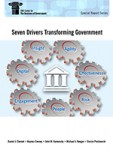 Seven Drivers Transforming Government
Seven Drivers Transforming Government
Tags: Digital Transformation, GovTech
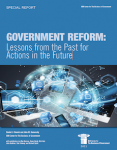 Government Reform: Lessons from the Past for Actions in the Future
Government Reform: Lessons from the Past for Actions in the Future
Tags: GovTech
 Forthcoming Research Reports
Forthcoming Research Reports
Tags: Future of Work, Generative AI, GovTech
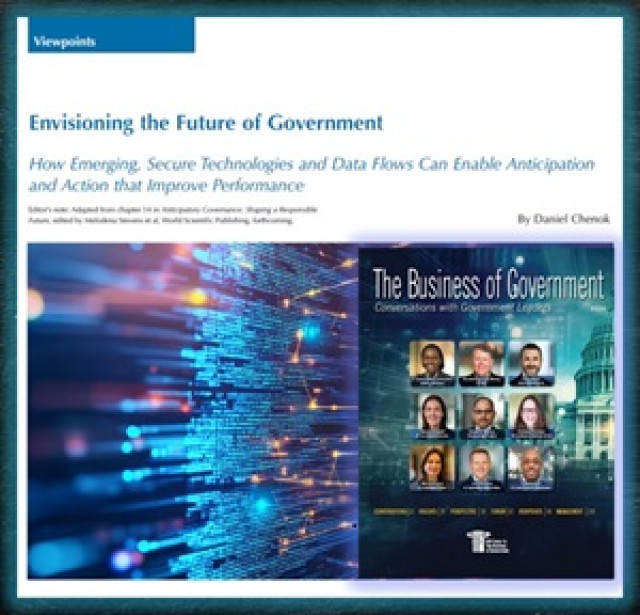 Envisioning the Future of Government
Envisioning the Future of Government
Tags: Cybersecurity, GovTech, Management
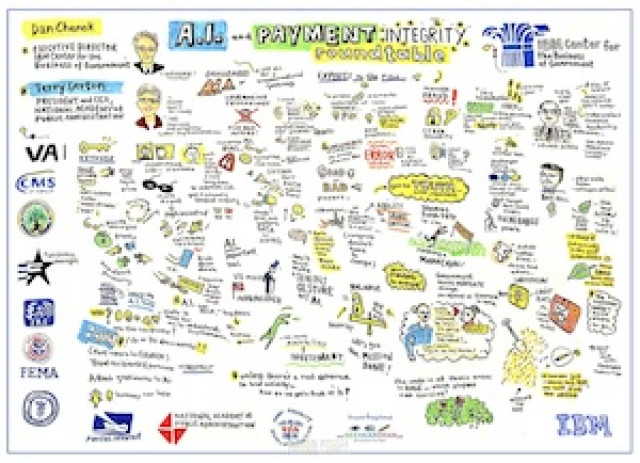 A recent roundtable addressed ways that Federal agencies can enhance processes and leverage AI to reduce fraud and errors in government programs.
A recent roundtable addressed ways that Federal agencies can enhance processes and leverage AI to reduce fraud and errors in government programs.
Tags: Cybersecurity, GovTech, Management
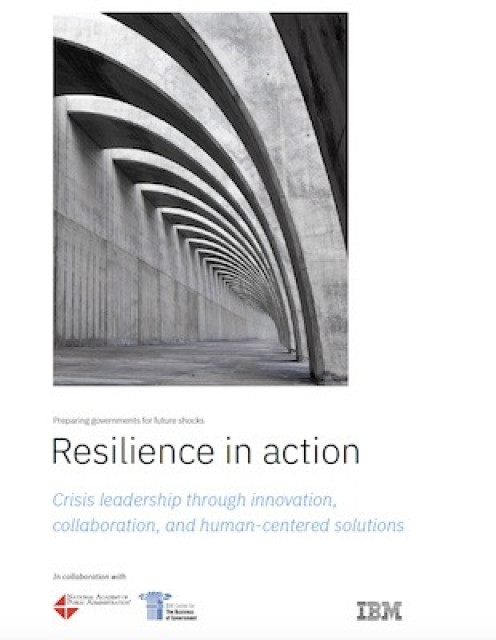 The IBM Center for The Business of Government is pleased to announce the winners of our challenge grant award competition that focuses on future shocks case studies.
The IBM Center for The Business of Government is pleased to announce the winners of our challenge grant award competition that focuses on future shocks case studies.
Tags: Cybersecurity, GovTech, Management
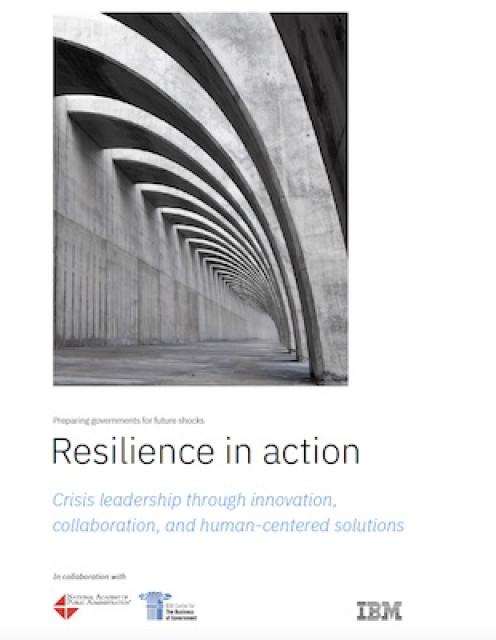 Announcing our Future Shocks Case Study Grant Competition Recipients
Announcing our Future Shocks Case Study Grant Competition Recipients
Tags: Cybersecurity, GovTech, Management
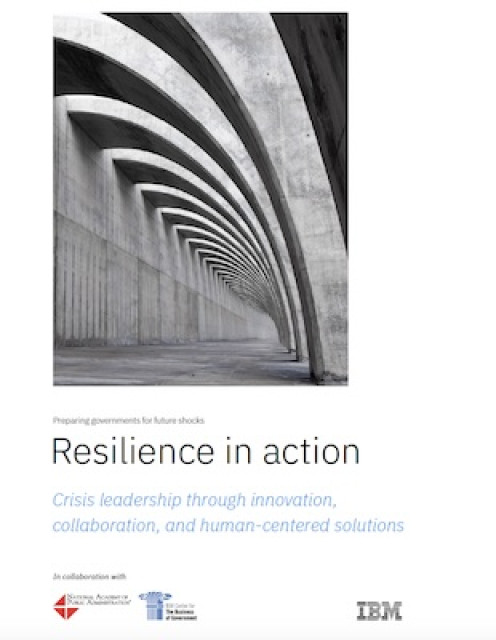 A new report highlights case studies of actions that provide models for adaptation across the public sector.
A new report highlights case studies of actions that provide models for adaptation across the public sector.
Tags: Cybersecurity, GovTech, Management
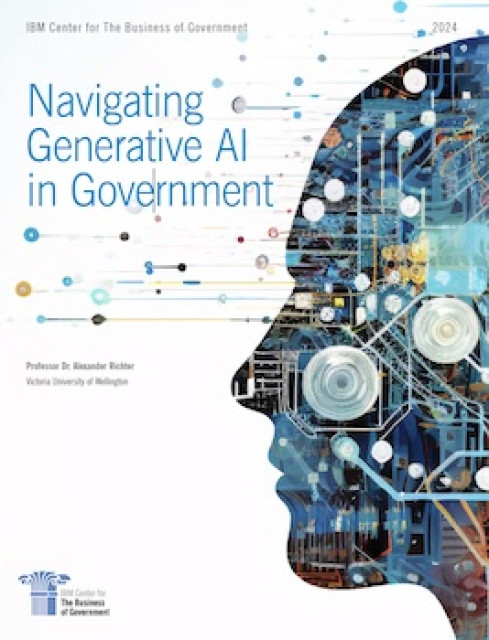 Implementing Generative AI in Government: Challenges and Opportunities
Implementing Generative AI in Government: Challenges and Opportunities
Tags: Cybersecurity, GovTech, Management
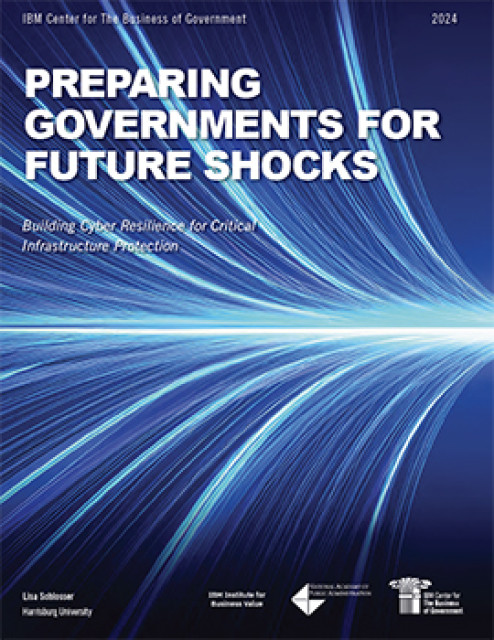 Protecting Our Community: Actions to Build Cyber Resilience in Critical Infrastructure
Protecting Our Community: Actions to Build Cyber Resilience in Critical Infrastructure
Tags: Cybersecurity, GovTech, Management
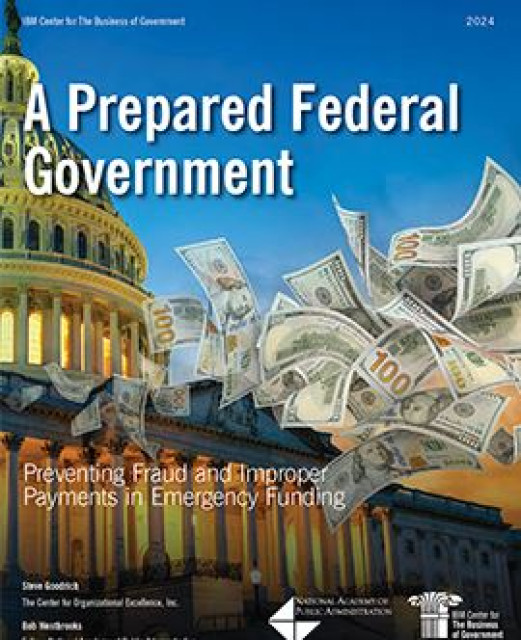 How Can Government Strengthen Spending and Tracking of Funds to Address Emergencies?
How Can Government Strengthen Spending and Tracking of Funds to Address Emergencies?
Tags: Cybersecurity, GovTech, Management
 Announcing the Center’s New Visiting Fellow: Dr. Karen Hardy
Announcing the Center’s New Visiting Fellow: Dr. Karen Hardy
Tags: Cybersecurity, GovTech, Management
 Bridging the Gap: Unlocking the AI Decision Advantage for Defense
Bridging the Gap: Unlocking the AI Decision Advantage for Defense
Tags: Cybersecurity, GovTech, Management
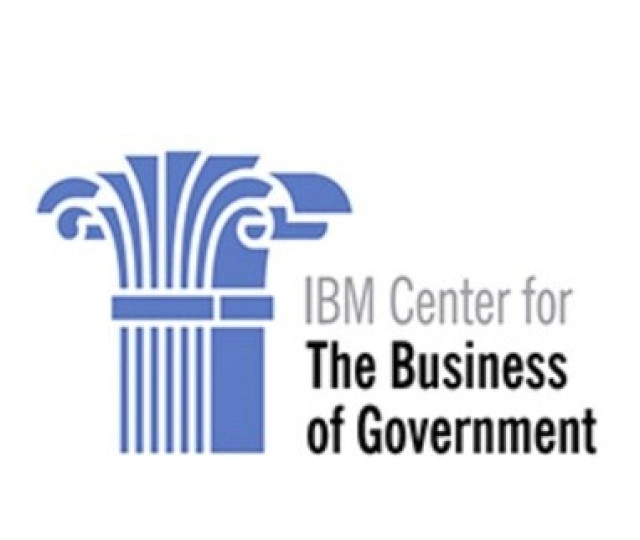 A Meeting of the Minds: The Center’s New Advisory Council
A Meeting of the Minds: The Center’s New Advisory Council
Tags: Cybersecurity, GovTech, Management
 AI for Tax Administrations: Governance and Innovation
AI for Tax Administrations: Governance and Innovation
Tags: Cybersecurity, GovTech, Management
 Announcing a new collaboration with the Government Technology & Services Coalition’s (GTSC) Homeland Security Today (HSToday).
Announcing a new collaboration with the Government Technology & Services Coalition’s (GTSC) Homeland Security Today (HSToday).
Tags: Cybersecurity, GovTech, Management
 Future Shocks Case Studies: A Challenge Grant Competition
Future Shocks Case Studies: A Challenge Grant Competition
Tags: Cybersecurity, GovTech, Management
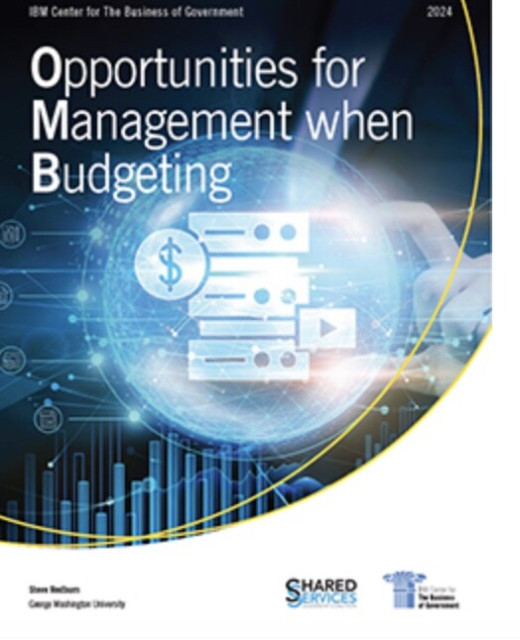 How Can Budget Actions Improve the Management of Government Programs that Serve the Public?
How Can Budget Actions Improve the Management of Government Programs that Serve the Public?
Tags: Cybersecurity, GovTech, Management
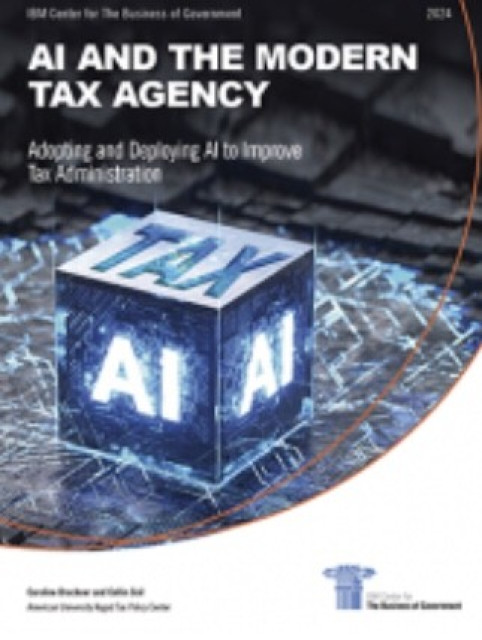 How Can AI Drive Better Taxpayer Experience and Improved Tax Agency Operations?
How Can AI Drive Better Taxpayer Experience and Improved Tax Agency Operations?
Tags: Cybersecurity, GovTech, Management
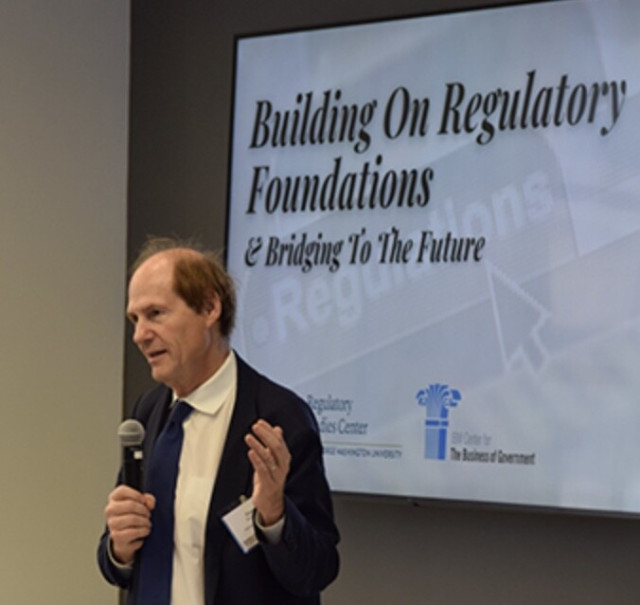 Event Highlights: Building On Regulatory Foundations and Bridging to the Future
Event Highlights: Building On Regulatory Foundations and Bridging to the Future
Tags: Cybersecurity, GovTech, Management
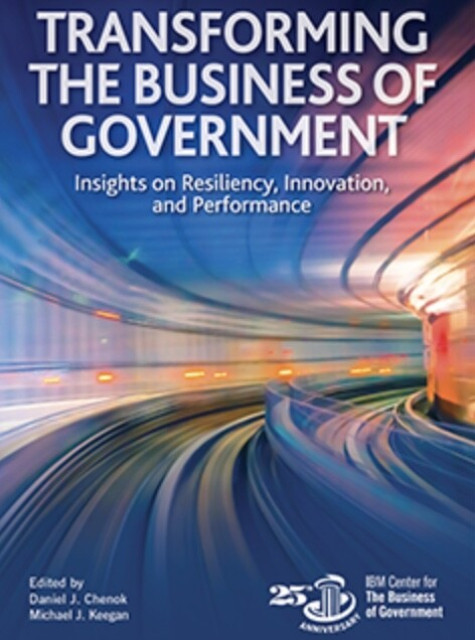 Highlights from the Center’s 25th Anniversary and Book Release Event
Highlights from the Center’s 25th Anniversary and Book Release Event
Tags: Cybersecurity, GovTech, Management
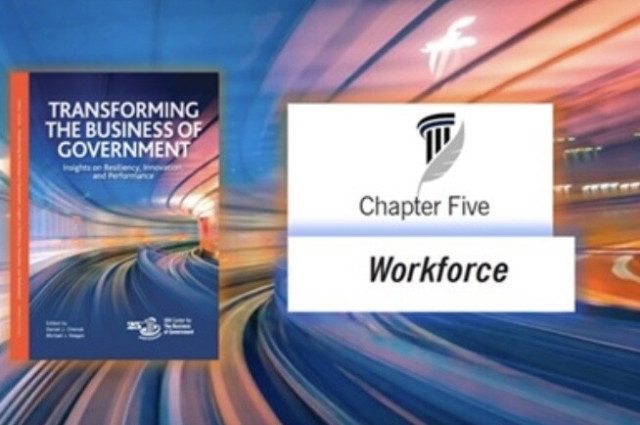 Workforce: Insights on Resiliency
Workforce: Insights on Resiliency
Tags: Cybersecurity, GovTech, Management
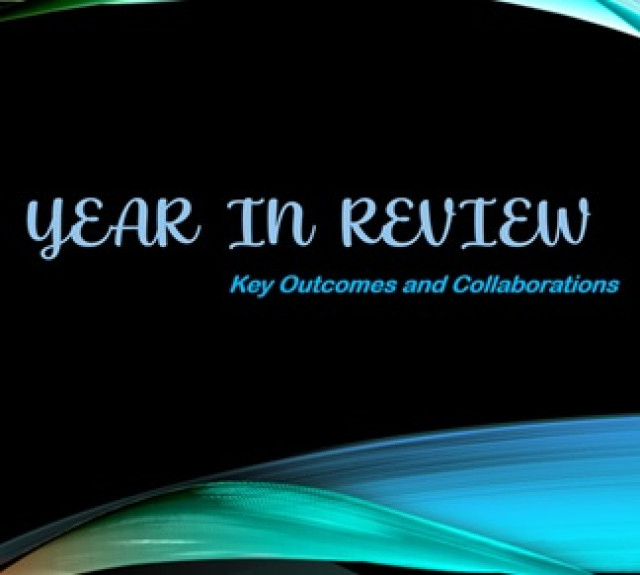 Year in Review 2023 and a Look Ahead
Year in Review 2023 and a Look Ahead
Tags: Cybersecurity, GovTech, Leadership
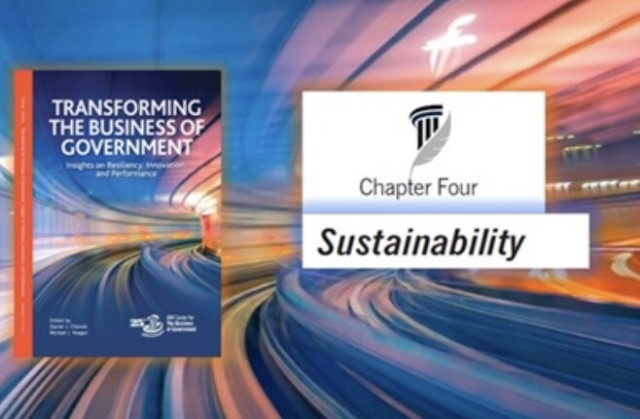 Sustainability: Insights on Resiliency
Sustainability: Insights on Resiliency
Tags: Cybersecurity, GovTech, Management
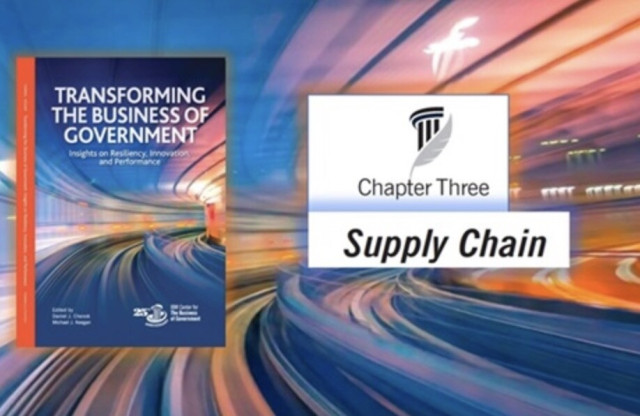 Supply Chain: Insights on Resiliency
Supply Chain: Insights on Resiliency
Tags: Cybersecurity, GovTech, Management
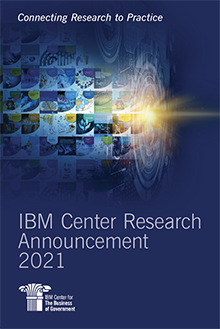 IBM Center Research Announcement 2021
IBM Center Research Announcement 2021
Tags: GovTech, Management, Leadership
 Setting up For IT success: Enhancing the impact of the Technology Modernization Fund
Setting up For IT success: Enhancing the impact of the Technology Modernization Fund
Tags: GovTech, National Security
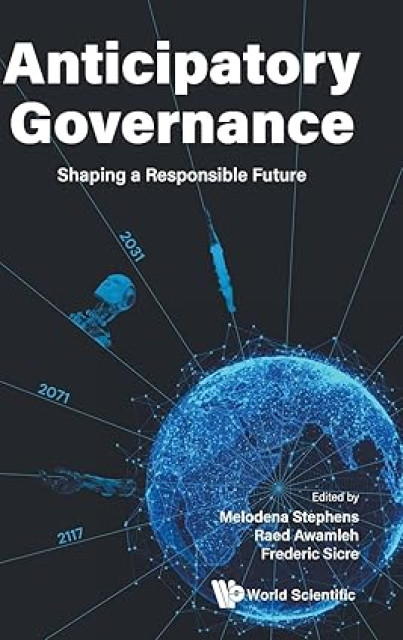 Anticipatory Governance
Anticipatory Governance
Tags: Cybersecurity, GovTech, Management
 Shared services: Getting past the sticking points
Shared services: Getting past the sticking points
Tags: GovTech
 Consolidating federal networks could lead to new security holes
Consolidating federal networks could lead to new security holes
Tags: Cybersecurity, GovTech
 Why tracking data centers is so hard
Why tracking data centers is so hard
Tags: Cloud, GovTech, Data Center
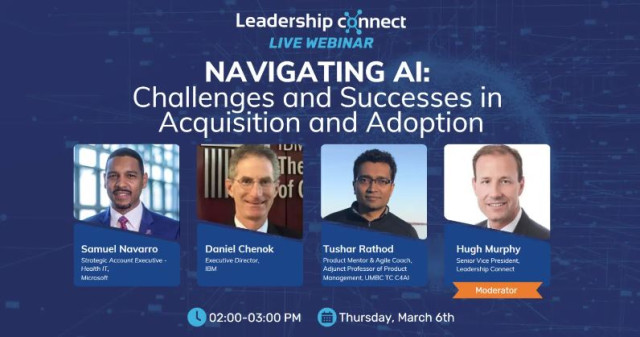 avigating AI: Challenges and Successes in Acquisition and Adoption
avigating AI: Challenges and Successes in Acquisition and Adoption
Tags: Cybersecurity, GovTech, Leadership
Date : September 25, 2020
 Forthcoming Research Reports
Forthcoming Research Reports
We are pleased to announce our latest round of awards for new reports on key public sector challenges, which respond to priorities identified in the Center's research agenda. Our content is intended to stimulate and accelerate the production of practical research that benefits public sector leaders and managers.
We expect the following reports to be published starting in late 2025. Short summaries of each report follow:
Accelerating Digital Transformation in Public Organizations Through Public Procurement by Ana Maria Dimand, Florida State University; Petra Ferk, New University, Slovenia; Jane Lynch, Centre of Public Value Procurement, Cardiff Business School, Cardiff University, UK; Andrea Patrucco, College of Business Florida International University; Esmee Peters, University of Twente, Enschede, Netherlands.
This report will investigate the impact of emerging technologies on public procurement processes across various countries. It will analyze how different nations implement these technologies, identify challenges in adoption, and assess their effects on efficiency, transparency, and cost-effectiveness. The report will provide actionable insights for public sector leaders in the U.S. and globally as well as a comparative analysis of technology implementation, best practices, common challenges, and policy recommendations.
Combining AI and Metadata Analytics for Enhanced Government Financial Oversight by Dr Irakli Petriashvili, Rutgers School of Public Administration’s Transparency and Governance Center
This report will investigate how AI and metadata analytics can enhance financial auditing processes at the federal level to detect fraud. By evaluating current audit practices of the GAO and agencies, analyzing public spending metadata, and applying machine learning models, the study will identify inefficiencies in traditional approaches and propose innovative solutions. Based on real-world datasets, the research aims to leverage government spending data in developing recommended strategies to increase financial audit capabilities. The findings aim to improve early fraud detection and enhance public sector performance and accountability.
Harnessing Generative AI: Boston’s Institutional Setup and Approach to Data-Driven Governance and Civic Engagement by Juncheng Yang, Data-Smart City Solutions, Harvard Bloomberg Center for Cities.
This report will explore Boston’s integration of Generative AI (GenAI) in urban governance, focusing on its pilot adoption and institutional foundation. By analyzing Boston’s position as the first U.S. city to release GenAI guidelines and its history of technological innovation, the study examines the institutional drivers and challenges in launching and governing recent GenAI initiatives. The investigation highlights GenAI’s impacts on data-driven decision-making, transparency, accountability, and inclusive civic engagement. The final report will offer evidence-based strategies, best practices, and actionable, scalable recommendations for adoption by local, State and Federal government leaders.
Immersive Workspaces: Reimagining the Future of Governmental Work for Innovation, Efficiency, and Wellbeing by Alexander Richter, Victoria University of Wellington and Shahper Richter, University of Auckland.
This report will examine and illustrate how immersive workspaces, leveraging technologies such as AI, VR, AR, and digital twins, can transform government workforce practices. The report will analyze established methods based on discussion with government officials in several countries, and will apply future-thinking approaches to explore the potential for workforce transformation using these technologies. The resulting report will combine forward-thinking scenarios of the future of government with actionable recommendations to help government agencies build adaptive & resilient teams, drive efficiency, and secure mission alignment.
Improving Federal Government Performance by Dr Howard Risher and James Perry, Indiana University.
This report will develop a practical strategy for improving agency performance, based on ‘hands-on’ involvement in the management of organizations across agencies and organizational levels with experienced officials and experts in private and public sector management. The report will highlight proven national and international ‘best practices’ that will be valuable to government leaders.
Tags: GovTech, Future of Work, Generative AI
 avigating AI: Challenges and Successes in Acquisition and Adoption
avigating AI: Challenges and Successes in Acquisition and Adoption Forthcoming Research Reports
Forthcoming Research Reports Anticipatory Governance
Anticipatory Governance Forthcoming Research Reports
Forthcoming Research Reports